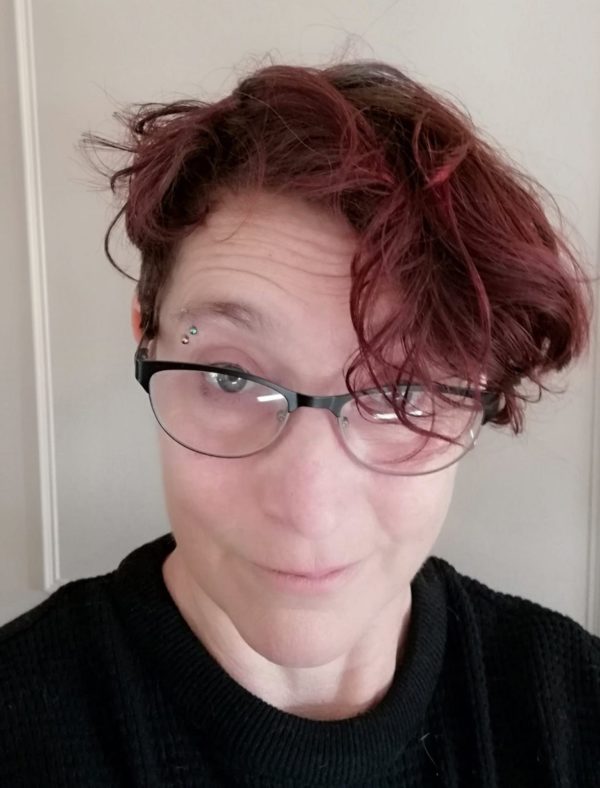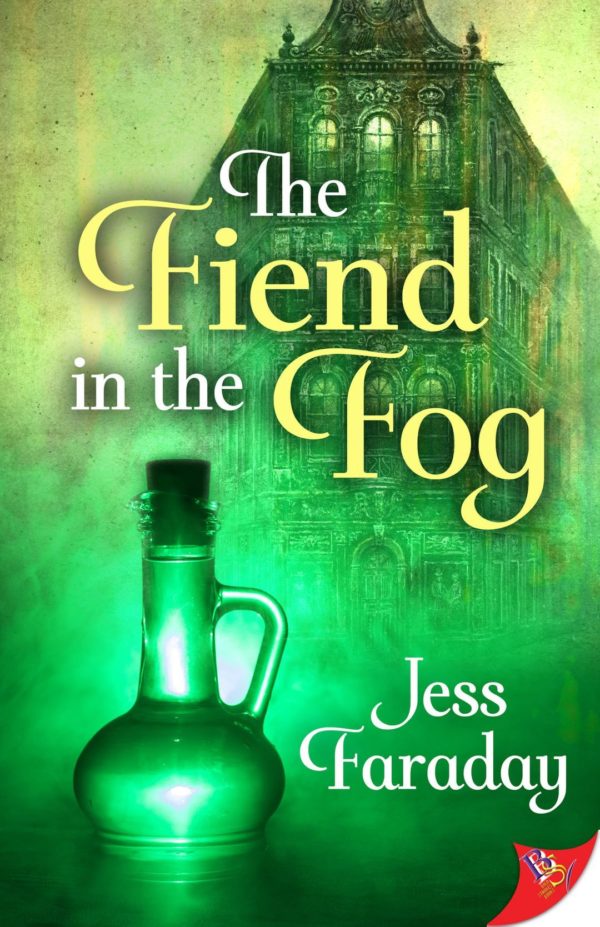
Welcome to my weekly Author Spotlight. I’ve asked a bunch of my author friends to answer a set of interview questions, and to share their latest work.
Today: Jess Faraday is an award-winning writer and editor of mystery and suspense. Her first novel, The Affair of the Porcelain Dog, was shortlisted for a Lambda Literary Award, and her third, Fool’s Gold, won the Rainbow Award for Best Gay Historical and was a runner up for Best Gay Novel overall.
Thanks so much, Jess, for joining me!
J. Scott Coatsworth: If you could sit down with one other writer, living or dead, who would you choose, and what would you ask them?
Jess Faraday: I’d love to sit down with Michelle Paver and ask how she can create an atmosphere so creepy it keeps me up at night, while being so sparse with actual description. Thin Ice and Dark Matter are masterpieces of horror, without very many horrific things being shown outright.
JSC: How would you describe your writing style/genre?
JF: I write historicals. Mostly mystery and suspense, occasionally with a low-key supernatural element.
JSC: What was your first published work? Tell me a little about it.
JF: My first published work was a very short biography of Abraham Lincoln. It was published in a booklet of student writing put out by the Arlington Heights Public Library when I was eight.
The bit of research I remember most was how Lincoln’s mother died from “milk sickness,” which comes from drinking the milk of animals that have fed on the poisonous White Snakeroot plant. It made me suspicious of dairy products for years to come.
JSC: What is the most heartfelt thing a reader has said to you?
JF: I once received a very long, very detailed, and highly negative review of my first book, based on a perceived slight to a secondary character. I won’t go into detail, but I hadn’t thought of it that way while I was writing the book, and seeing it from that reader’s point of view, it made a lot of sense.
Negative reviews are never any fun, but that one taught me to look at what happens to my characters from different angles, and to realize that characters may resonate with readers in different and unexpected ways. I try to be more careful, now, of the slings and arrows I deal to different characters, as well as how they’re resolved.
JSC: Have you ever taken a trip to research a story? Tell me about it.
JF: I haven’t taken a trip for the purpose of research, but numerous stories have come out of places that I had travelled before.
The Haunting of Comiston House is set in a large house that’s on my 5K running route. I always enjoyed looking at it and running through the neighbourhood that used to be its grounds.
The Cornwall stories in Shadow of Justice take a lot of the setting description from a few weeks I spent in the area.
The second half of Fool’s Gold is set in Sequoia, in central California, where I have been several times.
You never know when some detail might catch your eye or spark a story. It’s why I always have a camera and notebook in my bag!
JSC: What is your writing Kryptonite?
JF: I hate first drafting. Ideas that are so beautiful and interesting in concept come out sounding like they should be written in crayon! But that’s what the first draft is for—setting out the plot and the events. I always tell myself I can make the words pretty later, but it’s so hard to simply write out the events without tweaking every single word to perfection.
Another thing that I’ve started to do recently is write by hand. This is especially helpful if I have a chapter or scene to block out. It’s more trouble than it’s worth to keep crossing out words written by hand and replacing them with other words, so I just keep going until I’m done. It’s a lot easier than drafting on a computer.
JSC: What do you do when you get writer’s block?
JF: Often I’ll go for a walk or a run. I think best when I’m moving, and it’s a great way, for me anyhow, to work out plot tangles.
JSC: Do you use a pseudonym? If so, why? If not, why not?
JF: I do use a pseudonym. My given name is difficult to spell and pronounce, and for that reason, it’s not very easy to remember.
My pen name comes from Michael Faraday, the great 19th century scientist who was a pioneer in the study of electromagnetism. I used to design handbags and wallets with an internal Faraday cage, and my pen name is a nod to that, and to him.
JSC: If you could tell your younger writing self anything, what would it be?
JF: Just sit down and write the damn thing. Yes, it will be terrible. First drafts of first novels always are. Ok, fine, go have a walk, first, but then come back, sit down and finish it.
JSC: Do you ever base your characters on real people? If so, what are the pitfalls you’ve run into doing so?
JF: A lot of my characters have noticeable aspects of people that I know—habits, gestures, ideas. I’ve taken phrases that people have said to me that I’ve thought were neat and put them into my characters’ mouths. Fine words butter no parsnips was one. No single character is based on a single real person, but people who know me might recognize little glints and glimmers of themselves.
The main pitfall of basing characters on real people is, of course, that they might not find it flattering. But I never base an entire character wholesale on another person, and when I do put someone I know into a story, I try to do it in a way that would make them smile.
And now for Jess’s new book: The Fiend in the Fog:
1885, East London.
Abigail and Gideon are under siege. Noxious fogs have been bringing their clinic waves of indigent patients with inexplicable symptoms, telling wild tales of a demonic presence in the fog. If that’s not enough, someone wants the clinic for themselves, and they’re using the force of law to get it.
On the other side of town, heiress Meg Eisenstadt and her brother Nat live a life of well-intentioned aimless luxury. She dabbles in social justice causes and he pursues alchemy. And in a secret lab in the depths of Whitechapel, disgraced physician Jin Wylie attempts to rebuild his shattered life by performing dubious research for a shadowy cabal.
They live in separate worlds on different trajectories until the mysterious fiend in the fog brings them together.
Publisher | Amazon | iBooks | Barnes & Noble | Kobo | QueeRomance Ink | Smashwords | Goodreads
Excerpt
Bitter cold numbed Nurse Abigail Gordon’s face and fingers as she raced the setting sun past the Wapping docks. She’d left Whitechapel later than planned, and the evening shadows were already on her heels. Dark clouds were rolling in, bringing the sulphurous portents of another fog. The cold, black Thames slapped at the embankment as she passed, and the nearby shipworks echoed with ominous crashes and bangs.
Up ahead, a ragged clutch of men watched her approach. Walking faster, she slipped a white cloth band over her wrist and tugged it up her arm, adjusting it so that the red cross was clear. It might make an attacker think twice. It might not. Either way, she had to protect her bag.
She tightened her sweaty fingers around the handle of her Gladstone and drew herself up as tall as her five-foot frame would allow. As the uneven cobblestones passed beneath her feet, her mind registered the Old Stairs on her right, the dark-windowed buildings and warehouses to the left. Except for the men, the street was deserted, but just beyond them lay a passage to a busy marketplace. From there she could take the pennies she’d saved by walking this far and disappear into an omnibus.
As her path brought her closer to the group, she saw that they wouldn’t actually be men for a few years yet. Their faces were still smooth, their hard expressions not yet permanent. She guessed their ages to be between twelve and sixteen, which somehow made the implied malice worse. There were four of them, and as she approached, they shifted their glances from her bag, her pockets, her shoes to the pavement, the warehouses, the darkening clouds.
Her heart leapt when one of the youths suddenly stepped out into her path. He was skin and bones, with a threadbare woollen cap that sat askew over lank, brown hair. The filthy kerchief knotted around his neck that had once been white was now grey and spattered with rust-colored stains.
She stepped to the left, to the right. He matched her step for step, then waved his hand and produced a blade from below his tattered cuff.
“What’s in the bag, sister?”
“Nothing.” She pulled her Gladstone tight against her side. In addition to the phial—the precious phial she’d walked through Whitechapel to retrieve—her scalpel could find a lot of uses in a hand like his.
“Let’s have a look, then.”
She jerked around as rude fingers evaluated the wool of her coat-sleeve. Abby wasn’t that coat’s first owner, but it had been expensive once. Heart racing, she turned again, trying to keep all the youths in her sight. On closer inspection, not one of this nasty little pack appeared to have reached his sixteenth year. Sweat broke across her back, and that excellent coat suddenly seemed like a liability—too hot, too heavy, and too constricting to allow a quick escape.
The young men circled, bringing her back to the wall. Behind her the Thames undulated and roiled. If the tide were lower, she could have escaped down the stairs, but that time of day the black water ran high and fast. Abby knew how to swim, but not in the dead cold of November, and not when weighted down by heavy winter clothing.
As the youths closed in, she swung her bag. Three of them instinctively leaned away. The fourth one, though, the one with the knife, caught the bag and pulled her toward him.
“I’ll have that,” he said.
“No!” She yanked the bag out of his hands. “And,” she said, slapping at the nasty little fingers suddenly tugging at her sleeve, invading her pockets, reaching for her hat pin, “you can keep your filthy hands to yourselves!”
Thunder rumbled. A strange energy crackled through the air, and one of the little thieves hissed and jumped back as if burned. The boy with the knife laughed. Abby jerked her head back toward him. Then suddenly the youth flew backward with a surprised grunt, landing on his backside some distance away. His knife skittered across the cobblestones, coming to a rest somewhere in the shadows.
What had just happened? It didn’t matter. Abby ran.
Time seemed to slow. Her coat felt like it was made of lead, her bag as if it were filled with bricks. She’d remembered right about the alley, though—a passage between two warehouses. She didn’t slow as she turned. Her boots splashed through puddles, spattering her hems with she dared not guess what. Up ahead she could see fading daylight and hear the sound of the marketplace sellers ending their day. Just a few more steps…
It was this last thought that pulled her, chest heaving, feet cramping through to the end of the tunnel—and straight into an unsuspecting pedestrian. She had enough time to register a neat moustache and spectacles, a tidy brown overcoat, and an impeccably tied scarf, when his arms closed unexpectedly around her. She screamed.

